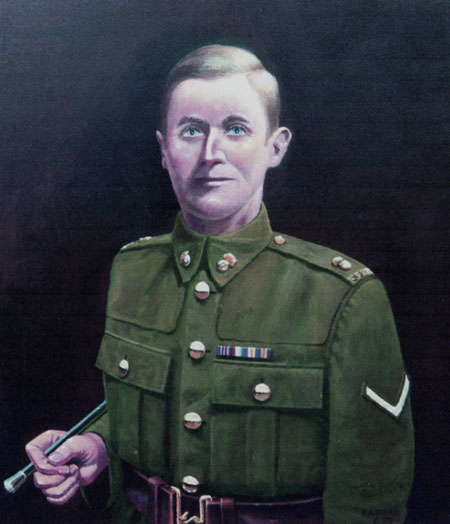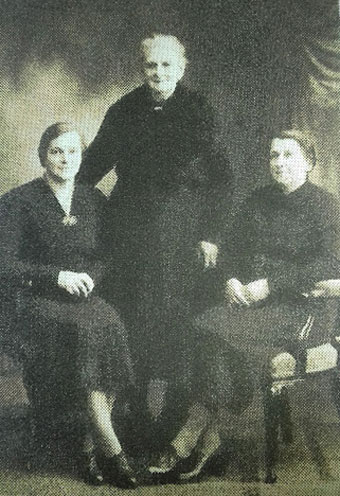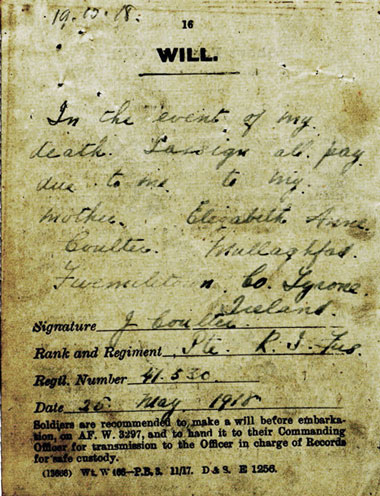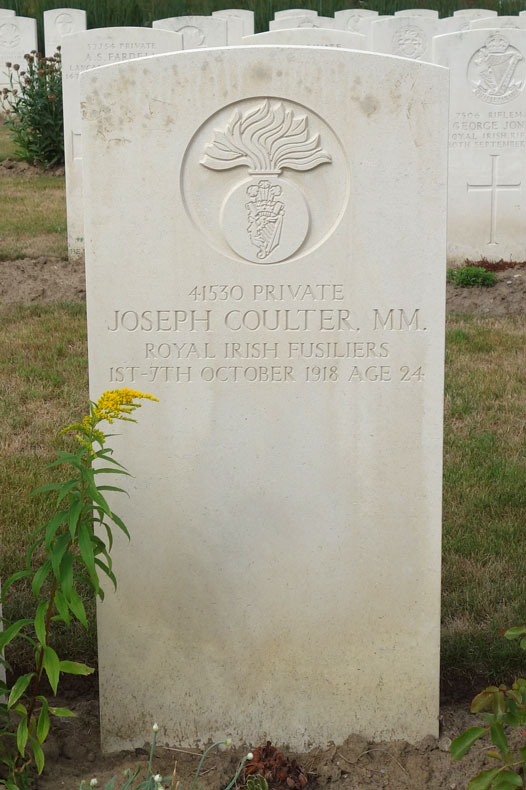![]() In memoriam
In memoriam ![]()
Private Joseph Coulter, MM

Joseph Coulter was born on 8 December 1893 at Mullaghfad, Fivemiletown, County Fermanagh, the seventh of ten children of farmer Thomas Coulter and his wife Eliza Anne (nee Robinson). By 1911 he was living with his family at Mullaghfad and working on the farm.
Coulter enlisted in the 6th (Inniskilling) Dragoons Service Squadron at Fivemiletown on 7 November 1914 (No. UD/150). He embarked for France with his squadron on 5 October 1915. At the time they were serving as divisional cavalry to the 36th (Ulster) Division. Later that year he was admitted to a field hospital with a fractured nose.
In June 1916 the Inniskilling squadron came together with C and F Squadrons of the North Irish Horse to form the 2nd North Irish Horse Regiment, serving as corps cavalry to X Corps until September 1917 when the regiment was dismounted and most of its men transferred to the infantry. After a brief period of training at the 36th (Ulster) Division's Infantry Base Depot at Harfleur, Coulter was transferred to the Royal Irish Fusiliers on 20 September and soon after was posted to the 9th (Service) Battalion – renamed the 9th (North Irish Horse) Battalion. He was issued regimental number 41530. He probably saw action with the battalion during the Battle of Cambrai in November and December 1917.
On 17 December 1917 Coulter left his unit for officer cadet training. After a period of leave, on 8 February 1918 he reported for duty at No.7 Officer Cadet Battalion at Fermoy. However his candidacy was unsuccessful and he was ordered back to France, rejoining the 9th (North Irish Horse) Battalion in the field at Proven on 8 June.
On 24 August the Battalion took part in a successful attack on the German lines near Bailleul. Coulter was awarded a Military Medal for his bravery during this action.
On 30 September 1918 the 9th (NIH) Battalion was ordered to advance on the Belgian village of Vijfwegen. The fighting centred on a small rise, Hill 41, which had been well fortified by the Germans and afforded a wide field of fire on troops attempting to move past it. During this and the following day they sustained numerous casualties – eight officers and 139 other ranks, including 29 killed in action and seven more who would die of their wounds. The battalion returned to the line on Hill 41 on 4 October, seeing further fighting over the next eight days.
Private Coulter was one of the men killed at this time, either on 1 or 7 October (probably the former). He was buried near where he fell in a temporary cemetery just north of Vijfwegen (map reference 28.K.18.c.8.0), the location marked with a cross. After the war his body was exhumed and re-buried in the Dadizeele New British Cemetery, Moorslede, West-Vlaanderen, Belgium, grave IV.B.12. His gravestone inscription reads:
41530 PRIVATE
JOSEPH COULTER. MM.
ROYAL IRISH FUSILIERS
1ST-7TH OCTOBER 1918 AGE 24


Coulter's mother and two of his sisters

Coulter's will
Gravestone and cemetery images Copyright © Phillip Tardif with all rights reserved as set out in this Use of Material policy. Image of Coulter with his medal ribbons added (presumably as a family remembrance) sourced from David A. Thorp's Battlefields-Art site. Image of Coulter's family and his will kindly provided by Doreen Mullan.
This page last updated 4 March 2023.

